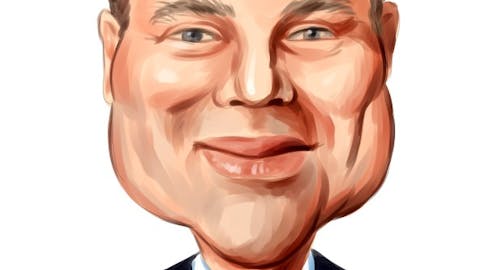
With the help of Fibonacci guru Tom DeMark, Cohen uses technical analysis in conjunction with fundamental tactics, and has a penchant for the services, basic materials, and technology sectors. Unlike his more traditional peers like Warren Buffett (see his full portfolio here) and David Einhorn, who each hold 30-40 positions for a relatively consistent period of time, Cohen employs quite a bit of turnover in his portfolio, a natural result of his decision to include technical indicators in his analysis.
In the third quarter of this year alone, from the start of July to the end of September, Cohen’s fund transferred out more than one third of its positions for new holdings. One of the most notable stocks that Cohen sold over this time was Lockheed Martin Corporation (NYSE:LMT), while he also chose to downsize his position in Amazon.com, Inc. (NASDAQ:AMZN) by two-thirds, and cut his stake in Murphy Oil Corporation (NYSE:MUR) by a whopping 99%. Two of the most intriguing bets, meanwhile, made by the hedge fund manager were in Sirius XM Radio Inc (NASDAQ:SIRI) and American International Group, Inc. (NYSE:AIG).
After owning just fewer than 90,000 shares of AIG at the end of the second quarter, Cohen increased his position in the recovering insurer to a whopping 8.7 million shares – worth a market value of $286.1 million – last quarter. With the transaction, AIG is now one of the ten largest holdings in Cohen’s 13F portfolio. Other hedge funds making the move into AIG in Q3 were plentiful, as a total of 110 funds held long positions in the insurer at the end of September, compared to 61 at the end of June. The most notable AIG investors aside from Cohen are Leon Cooperman – another DeMark employer – and Dan Loeb.
It’s likely that many of these money managers bought in on the company’s latest share buyback from the U.S. Treasury in September, when the $182.3 billion taxpayer loan it received four-plus years ago was pushed into profitability, passing an important psychological level. Shares of AIG hit a 52-week high of $36.67 in early October before fears of Hurricane Sandy-related losses pushed the company down to the $31 territory. With a positive surprise in its most recent earnings, AIG is well on its way toward further appreciation, as it sports a surprisingly cheap valuation, at 8.9 times forward earnings and a book value discount of nearly 50%.
When looking at Cohen’s other bullish bet in Sirius XM, we can see a decidedly similar value play, despite the fact that Liberty Media’s takeover effort has pushed shares up by more than 37% over the past six months. Post-election, the stock has been dragged down into the $2.60 range, but that only makes the sub 1.0 PEG and trailing P/E below 6.0X more attractive. The broadcasting company did miss the Street’s earnings estimates by a penny, coming in with one-cent earnings, but revenue rose by 14% year over year, beating consensus.
Assuming a deal with Liberty is passed by the FCC, Sirius will either remain a subsidiary of the company, or spin it off into a separate venture, perhaps even merging it with a third player. Each of these scenarios can create wealth for Cohen and other bulls, as Sirius is in a prime position due to reduced competition, and expanded OEM contracts with GM and Ford have the potential to drive growth by double-digits over the intermediate term. Sell-side analysts certainly agree, and are predicting Sirius to expand its earnings by an average of 27.9% over the next five years.
Moving onto Amazon and Murphy Oil, two of Cohen’s most notable cuts in Q3, we notice that each stock has been down by at least seven percentage points over the past month, as each recorded disappointing profit figures last quarter. That’s where the similarities end between this e-retailer and oil and gas E&P, but they’re important to point out.
In Amazon’s case, it reported a loss (adjusted for its LivingSocial debacle) of 23 cents a share, far below consensus of -$0.08 a share. The company’s daily deal acquisition has lost 95% in value since it was purchased two years ago, and operating margins have remained below 2% in five consecutive quarters.
With a cash flow premium of nearly 50% above historical averages and a trailing P/E greater than 3,000X, it’s easy to question if there’s still any value to be had with Amazon, especially when we consider the ever-shrinking gap between itself and competitors like e-Bay and many traditional retailers.
Murphy Oil, meanwhile, is one of the most singularly focused energy companies out there, with over four fifths of its product mix dependent on oil. Before poor third quarter results were announced, in which earnings declined by 44% from one year earlier, the oil and gas E&P had been boosted by WTI crude prices above $100 a barrel for much of the year’s first half. Prices have since fallen off, though, and foreign exchange variations haven’t done Murphy Oil any favors.
The company is planning to spin off its U.S. downstream business into an entity called Murphy USA by the middle of 2013, though the benefits of this split won’t hit Murphy Oil until at least this time next year. In a portfolio as mobile as Cohen’s, we can understand why he may hesitate to snatch up the stock until next year, and individual investors may serve well by taking a wait-and-see approach as well. Year-end earnings are expected to actually finish lower than in 2011, so unless commodities take a sharp turnaround over the next month or so, we don’t see Murphy generating enough traction to impress in the fourth quarter.
Last but certainly not least, it’s important to discuss Lockheed Martin, which Cohen closed out in the third quarter. The hedge fund manager held $41.8 million worth of the aerospace company at the end of June. Over the past month, Cohen’s sale appears to have paid off, as he has avoided a loss of more than five percentage points; the company recently reported that third quarter revenue fell by 1.7% to $11.9 billion from one year earlier.
The U.S. government’s largest defense contractor is dependent on a booming DoD budget, but the re-election of President Obama all but rings a death knell to the days of high-flying growth, literally. Many of Lockheed Martin’s flagship products, including the F-22 fighter and anti-missile systems, may be on the cutting block as budgets are cut. The company does produce a bevy of unmanned drones, but it has far less of a competitive advantage in this arena. With expected EPS growth of nearly four percentage points below that of its closest competitor Boeing – while trading at a higher PEG valuation – we’d understand if individual investors followed Cohen out of Lockheed, or even considered taking a short position.





